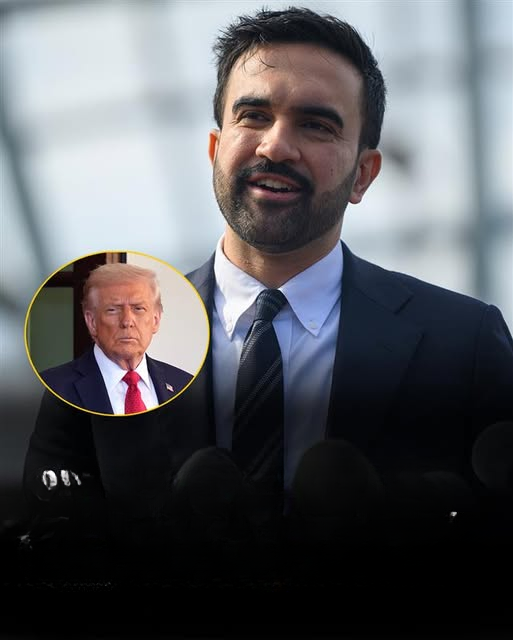Zohran Mamdani made history on election night, becoming New York City’s first Muslim mayor-elect and the first mayor in the city’s history who is Muslim, South Asian, African-born, and part of the Millennial generation. But only days after the celebration, he found himself at the center of a political firestorm unlike anything New York has seen in recent decades.
While millions of New Yorkers viewed his victory as a milestone in representation and political change, his election also sparked heightened criticism and national debate — some of it coming from high-profile political figures.
A Landslide Victory and a Message of Change
Mamdani, a 34-year-old progressive legislator, won the November 4, 2025 election with a strong lead over two well-known opponents: former Governor Andrew Cuomo, who ran as an Independent, and Republican candidate Curtis Sliwa.
During his election night speech at the Brooklyn Paramount, Mamdani acknowledged the historic moment and the long road ahead.
“I am young. I am Muslim. I am a democratic socialist. And I refuse to apologize for any of this,” he told supporters, receiving thunderous applause.
He added that New Yorkers had delivered “a mandate for change,” highlighting the themes that defined his campaign.
A Platform Focused on Affordability and Public Services
Mamdani centered his campaign on addressing the city’s affordability crisis. His proposals included:
- Free public bus service
- Universal childcare
- A rent freeze on stabilized apartments
- Expanded tenant protections
- Public housing improvements
- Strengthened social programs for working families
Supporters, especially younger voters and working-class communities, embraced these ideas as much-needed relief. Critics questioned the financial feasibility, sparking vibrant debate throughout the campaign.
But Mamdani’s grassroots organizing, small-donor fundraising, and community-focused outreach built a coalition that ultimately secured his victory.
An Immigrant Story That Resonated
Born in Kampala, Uganda, in 1991, Mamdani immigrated to the United States at age seven. He lived in New York as a permanent resident until becoming a U.S. citizen in 2018, a moment that shaped his perspective on fairness, inclusion, and opportunity.
His background and his advocacy for immigrant communities became central to his public profile, helping him connect with diverse groups across the city.
National Attention and Rising Political Tensions
Mamdani became a highly discussed figure on the national stage long before Election Day. His strong statements regarding immigration enforcement — particularly relating to how federal agents operate in New York — drew both support and pushback.
In June 2025, after Mamdani criticized aggressive enforcement tactics, national political voices responded sharply. Some public comments questioned his proposals and expressed disagreement with his positions.
Fact-checking organizations later clarified that debates around his naturalization status were unfounded and lacking evidence, emphasizing that citizenship cannot be revoked over political disagreements.
Mamdani Responds to Public Criticism
The mayor-elect addressed the rhetoric surrounding his candidacy in a public statement, noting that intense political disagreements should not overshadow the importance of respecting democratic processes.
He emphasized his commitment to governing transparently and ensuring that all communities in New York feel protected and represented.
“This is not just about me,” he said. “It is about every New Yorker who deserves to live without fear and with dignity.”
His remarks were widely shared, resonating with many who felt the debate reflected larger national divisions about identity, leadership, and policy.
Growing Debate on Social Media and in Congress
As the election approached, discussions intensified further. Public comments from national political figures raised questions about his policy proposals and political ideology. These statements received extensive media coverage and sparked spirited debate among voters across the country.
On October 29, Congressman Andy Ogles issued a statement calling for an investigation into Mamdani’s naturalization process. Legal experts quickly responded, noting that:
- There is no evidence of wrongdoing.
- Naturalized citizenship cannot be revoked as a political response.
- Any citizenship dispute would require a federal court process supported by credible evidence.
Immigration attorneys and constitutional scholars described the claims as political commentary rather than actionable legal challenges.
Preparing to Lead Amid Heightened Attention
With his inauguration on January 1, 2026 approaching, Mamdani’s transition period is unfolding under exceptional scrutiny. Unlike many newly elected mayors who experience a political “honeymoon,” he is entering office during an intense national conversation about immigration, federal-local relations, and political identity.
Nevertheless, he continues to frame his upcoming administration around unity and service.
During his victory speech, he delivered a line that quickly spread across social media:
“To get to any of us, you will have to get through all of us.”
Supporters viewed it as a statement of solidarity; critics saw it as bold political messaging. But no matter the interpretation, it underscored the significance of the moment.
A City — and Nation — Watching Closely
The political discussions surrounding Mamdani’s election reflect broader national themes, including:
- The boundaries of presidential authority
- The rights of naturalized citizens
- The responsibilities of local governments
- How political rhetoric influences public safety
- The role of activism within elected leadership
His victory represents a major milestone in the story of New York City, but the debates now forming around him will likely affect national politics for years to come.
Regardless of political perspective, Zohran Mamdani’s rise from immigrant child to mayor of America’s largest city is an extraordinary moment — one that is now shaping conversations about democracy, identity, and the future of urban leadership in the United States.

